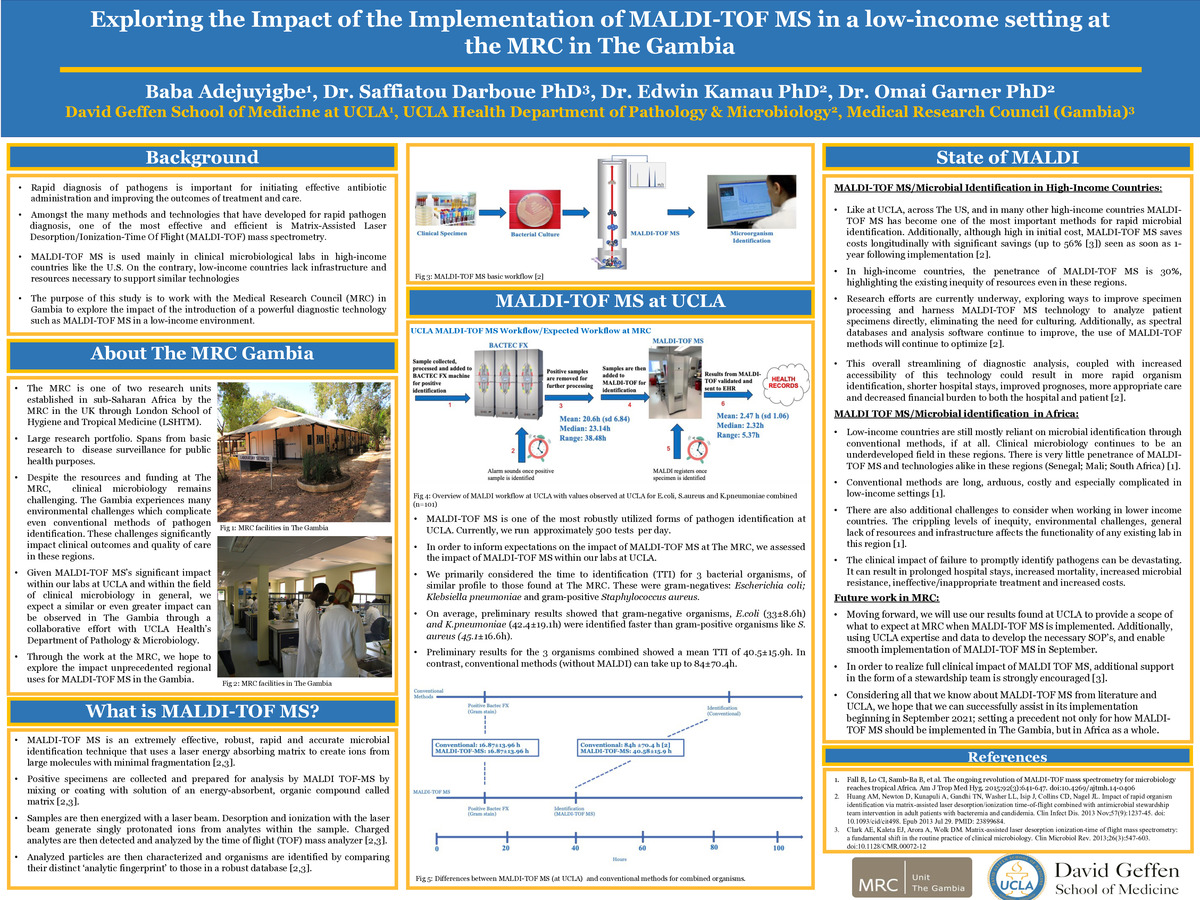-
Author
Babapelumi Adejuyigbe -
PI
Dr. Omai Garner PhD
-
Co-Author
Baba Adejuyigbe, Dr. Saffiatou Darboue, Dr. Edwin Kamau
-
Title
Exploring the Impact of the Implementation of MALDI-TOF MS in a low-income setting at the MRC in The Gambia
-
Program
STTP
-
Other Program (if not listed above)
-
Abstract
Rapid diagnosis and identification of pathogens is important for initiating effective antibiotic administration and improving clinical outcomes. Amongst the many methods and technologies that have developed for rapid pathogen diagnosis, one of the most effective and efficient is Matrix-Assisted Laser Desorption/Ionization-Time of Flight (MALDI-TOF) mass spectrometry. MALDI-TOF MS is an extremely effective, robust, rapid and accurate microbial identification technique that uses a laser energy absorbing matrix to create ions from large molecules with minimal fragmentation. It is used mainly in clinical microbiological labs in high-income countries like the U.S to rapidly and accurately identify microbial organisms like bacteria and yeast for clinical purposes. On the contrary, low-income countries lack infrastructure and resources necessary to support similar technologies. As a result, clinical microbiology remains largely underdeveloped in these areas, affecting clinical outcomes. The purpose of this study is to work with the Medical Research Council (MRC) in The Gambia explore the impact of the introduction of a powerful diagnostic technology such as MALDI-TOF MS in a low-income environment. Given MALDI-TOF MS’s significant impact within our labs at UCLA and within the field of clinical microbiology in general, we expect a similar or even greater impact can be observed with its implementation at the MRC and in Gambia at large through a collaborative effort with UCLA Health’s Department of Pathology & Microbiology. In order to inform expectations on the impact of MALDI-TOF MS at the MRC, we assessed the impact of MALDI-TOF MS within our labs at UCLA. We primarily considered the time to identification (TTI) for 3 bacterial organisms, of similar profile to those found at the MRC. These were gram-negatives: Escherichia coli; Klebsiella pneumoniae and gram-positive Staphylococcus aureus. On average, preliminary results showed that gram-negative organisms, E. coli (33±8.6h) and K. pneumoniae (42.4±19.1h) were identified faster than gram-positive organisms like S. aureus (45.1±16.6h). Preliminary results for the 3 organisms combined showed a mean TTI of 40.5±15.9h. In contrast, conventional methods (without MALDI) can take up to 84±70.4h. These results provide a foundation for what to expect when MALDI-TOF MS is implemented at MRC in September 2021.
-
PDF
-
Zoom

